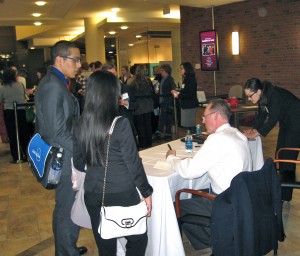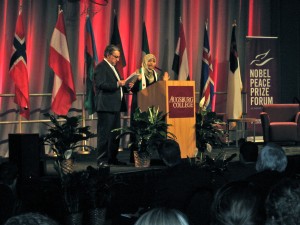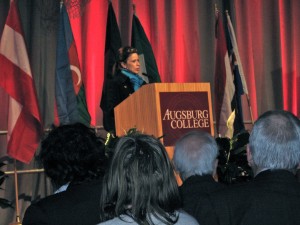#701 – Dick Bernard: Personal Lessons Learned (and re-learned) at the 2013 Nobel Peace Prize Forum
Events like the recent Nobel Peace Prize Forum at Augsburg College are extraordinarily difficult to plan and then implement (let’s say “stage manage”). You don’t want the advertised event to be advertised to start at 11 a.m., only to have it begin at 11:45, etc.
In all respects, the Forum was impeccably planned.
Having said that, my most important learnings from such events tend most often to come from side-events that cannot be factored in to the planning. Here I want to list some that come immediately to mind. (None of these are unique; at the same time, they are good reminders….)
Dr. Paul Farmer’s autograph line: I had never met Paul Farmer, nor heard him speak in person, so his talk was a must-see, and it made sense to get an autograph. I got in the line at 4:30, and 4 1/2 hours later found myself, finally, at arms length from Dr. Farmer, with the four books I had brought along.
Turns out that Dr. Farmer walks the talk of his essential message, that “without equity and justice there cannot be peace.” His reasoning, I gather, is that if somebody cares enough to want his autograph, they have a right to expect some of his time.
I think most of us came to realize this, after facing a seemingly eternal wait.
I met some people in that line who I would not have met before, had we been shuffled ahead rapidly to get our ten seconds with the author (“next, please”).
But the most important learning was about patience, and our general lack of it in our society. And thinking of those peasants in Haiti who stood in line for hours, after hours more walking, to vote for their candidate Aristide, without any certainty that they would even be able to cast a ballot at all. Or more directly to the point, remembering when we visited Farmer’s Zanmi Lasante Hospital at Cange, and saw the very long line of very sick people waiting for just the possibility of getting some medical help for an ailment that was probably about to kill them. Some had been there for, perhaps, days.
Then, that line to get a signature on a book didn’t seem so long at all.
(click on photos to enlarge them)
A short conversation with a College-age friend: Some weeks ago I got an out-of-the-blue e-mail from a young man who I’d met at the 2010 Peace Prize Festival. He was, then, an exchange student from a foreign country. He re-introduced himself to me at the Forum, and in our brief chat said he had not gone home after high school because it was deemed to be too dangerous for him. We didn’t have time to fill in the blanks, but we didn’t need to, either.
With all of our complaining about this, that and the other, the United States is still a mecca for those seeking relative peace and freedom. There are LOTS of warts, and we are responsible for plenty of instability elsewhere, but we need to build on our positives.
Listening to Nobel Laureate Tawakkol Karman (You can watch/listen on-line here: I found it a bit difficult to get into Ms Karman’s Laureate address at the end of the Conference. Formal public speaking did not yet seem to be her forte, yet, (give her a little time) and, I suppose, she didn’t have a raft of what I would call “Mother Theresa one-liners”.
While she spoke and understood English very well, it was her personal preference to speak in her native Arabic (which I applaud). We English speakers are used to being the dominant language, but by no means is English the only world language. Others are proud of their languages too – we are a richer world for such diversity. (Here you can find Dr. Joseph Schwartzbergs effort to demonstrate 41 different languages affirming human oneness. Dr. Schwartzberg was at Mrs. Karman’s talk.)
Towards the end of her formal remarks Ms Karman began a song – a chant – that had ignited the peaceful revolution in Yemen for which she won the Peace Prize. She seemed to become more alive, and the crowd alive with her. It was dramatic and it was very, very powerful.
It brought to life a piece of advice I heard in a eulogy for a friend at his recent funeral. He had been an English teacher, and he taught some writing. His advice to fearful writers was simple: “write what you know, and write from the heart”. Ms Karman spoke what she knew, but it was when she truly spoke from the heart that she was truly speaking.
Robin Wrights message: I wasn’t sure what to expect from Robin Wright. Turned out that her familiarity with the Middle East and North Africa went back as far as 1973.
Her analysis of the drivers in the contemporary Islamic World (which you can also hear/see on-line here), was extremely interesting. Succinctly, you don’t make change today by doing things the way the old men did them, and the old women understood and accepted them. She listed drivers of change in the Islamic region that the previously dominant leaders do not understand as drivers: theater, even comic books.
Come to think of it, that dynamic of change does not stop at national or ethnic boundaries, and the old men used to ruling, including in our society, are running scared.
Nonetheless, the transition from Arab Spring to a new reality will be rocky and difficult. True, deep change is hard, a process to a hoped for destination.
Somebody asked, would there be a woman president in that region? Robin observed that there has never been a woman U.S. president, and that in many respects the Islamic world is far ahead of us in this respect. Even the most repressive regimes need to pay attention to the women.
Finally (only because I’m out of time to do this), the composition of the audience was very interesting.
There were many young people – doubtless heavy on university students, but nonetheless taking a weekend at a conference, and definitely engaged in the proceedings. There is (in my opinion) a disconnect between what I would call the traditional peace and justice community and today’s kids. There needs to be much attention to build relationships and learn how to communicate with each other. I think the responsibility for this change lies primarily with the elders, and that we need to go more than half way…the old ways, especially in communication, are changing too rapidly. Failing to find common understandings about many things will weaken an ever more crucial movement.



